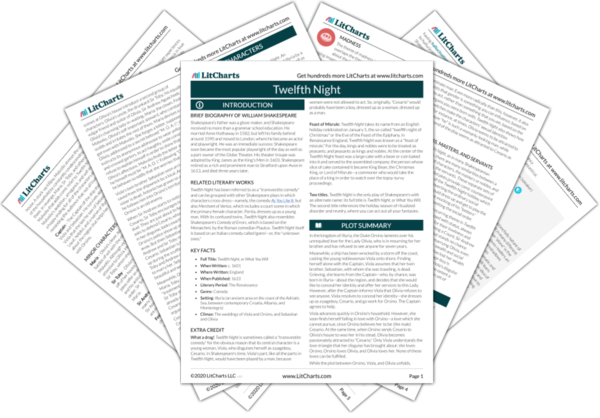Welcome to the LitCharts study guide on William Shakespeare's Twelfth Night. Created by the original team behind SparkNotes, LitCharts are the world's best literature guides.
Twelfth Night: Introduction
Twelfth Night: Plot Summary
Twelfth Night: Detailed Summary & Analysis
Twelfth Night: Themes
Twelfth Night: Quotes
Twelfth Night: Characters
Twelfth Night: Symbols
Twelfth Night: Literary Devices
Twelfth Night: Quizzes
Twelfth Night: Theme Wheel
Brief Biography of William Shakespeare

Other Books Related to Twelfth Night
Key Facts about Twelfth Night
- Full Title: Twelfth Night, or What You Will
- When Written: c. 1601
- Where Written: England
- When Published: 1623
- Literary Period: The Renaissance
- Genre: Comedy
- Setting: Illyria (an ancient area on the coast of the Adriatic Sea, between contemporary Croatia, Albania, and Montenegro)
- Climax: The weddings of Viola and Orsino, and Sebastian and Olivia
Extra Credit for Twelfth Night
What a drag! Twelfth Night is sometimes called a "transvestite comedy" for the obvious reason that its central character is a young woman, Viola, who disguises herself as a pageboy, Cesario. In Shakespeare's time, Viola's part, like all the parts in Twelfth Night, would have been played by a man, because women were not allowed to act. So, originally, "Cesario" would probably have been a boy, dressed up as a woman, dressed up as a man.
Feast of Misrule: Twelfth Night takes its name from an English holiday celebrated on January 5, the so-called "twelfth night of Christmas" or the Eve of the Feast of the Epiphany. In Renaissance England, Twelfth Night was known as a "feast of misrule." For the day, kings and nobles were to be treated as peasants, and peasants as kings and nobles. At the center of the Twelfth Night feast was a large cake with a bean or coin baked into it and served to the assembled company; the person whose slice of cake contained it became King Bean, the Christmas King, or Lord of Misrule—a commoner who would take the place of a king in order to watch over the topsy-turvy proceedings.
Two titles. Twelfth Night is the only play of Shakespeare's with an alternate name: its full title is Twelfth Night, or What You Will. The second title references the holiday season of ritualized disorder and revelry, where you can act out all your fantasies.







